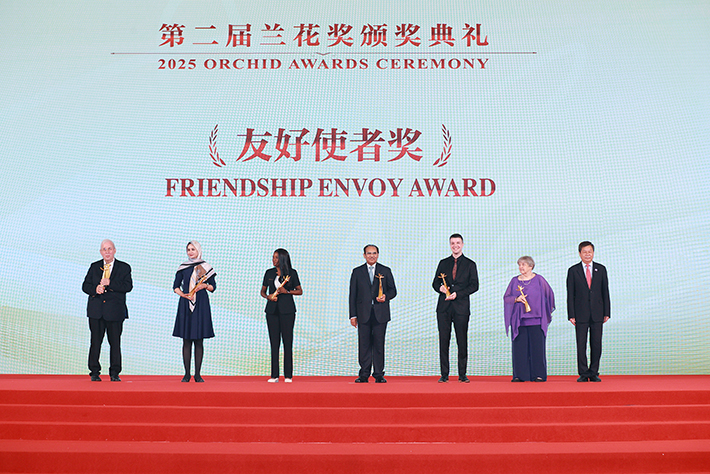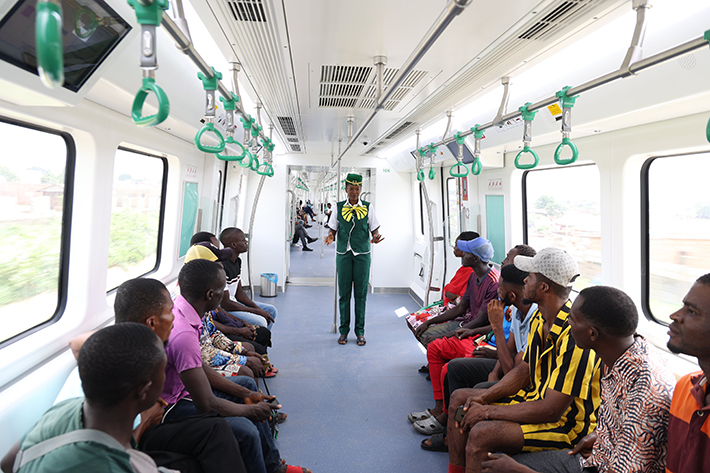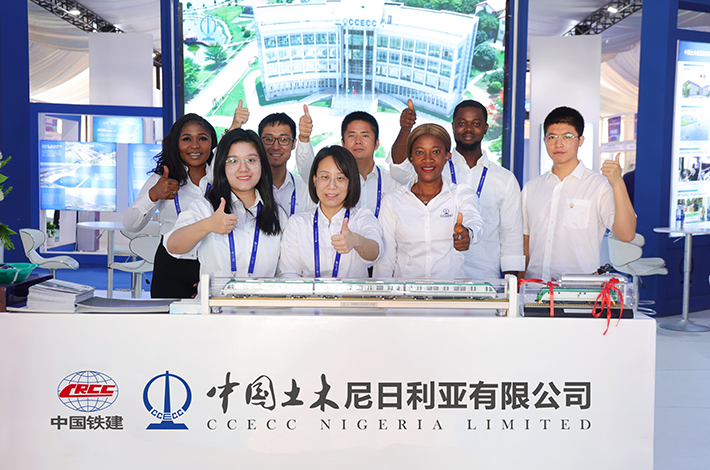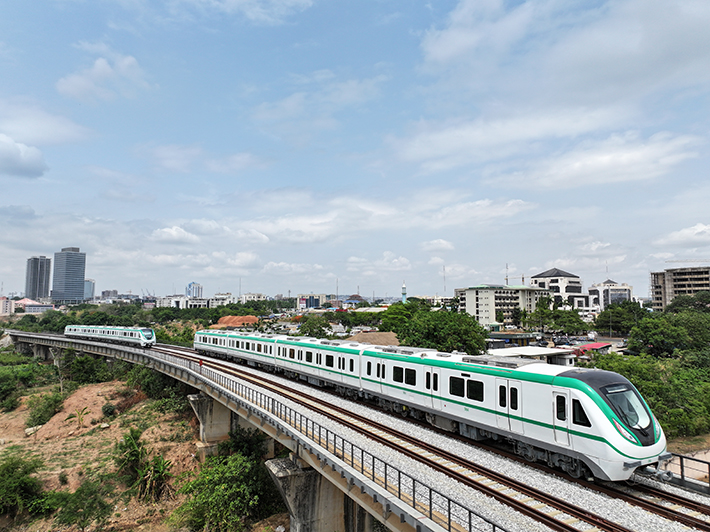Envoy of friendship

Issah Abiola (third left) is honoured with the Friendship Envoy Award at the Orchid Awards ceremony held in Beijing on 10 July (COURTESY)
In mid-July, guests gathered at the Beijing Hotel in China's capital to witness the presentation of Orchid Awards to 10 ambassadors of culture from different continents. They were chosen from over 300 candidates from around 80 countries.
Among the winners was Issah Abiola, Nigeria's first female train driver, who received the Friendship Envoy Award in recognition of her outstanding contributions to fostering understanding and friendship between African and Chinese people. Her role as a train driver for the Abuja Light Rail made her a trailblazer in a sector traditionally dominated by men, and a powerful symbol of China-Africa cooperation in infrastructure and capacity building.
Organised by China International Communications Group, the Orchid Awards recognise individuals and organisations for their exceptional contributions to exchanges and mutual learning among civilisations. This year marks the second edition of this event.
At this year's ceremony, six individuals received the Friendship Envoy Award, while two others and the Philadelphia Orchestra were presented with Outstanding Achievement Awards. Irina Bokova, former director general of UNESCO and senior adviser to the Board of Directors of the Europe-Asia Centre, was honoured with the Lifetime Honorary Award.

Issah Abiola speaks to passengers on a train in Abuja, Nigeria, in June 2024 (COURTESY)
A dream realised
Also known by her Chinese name Bai Yang, Abiola joined China Civil Engineering Construction Corp. (CCECC) in Nigeria in 2008. Over the years, she has actively promoted the achievements of cooperation between Chinese enterprises and the Nigerian people through various media channels, inspiring millions in both China and Africa.
Being a train driver has been Abiola's dream since childhood. She recalled how she encountered a"long car" when walking with her grandfather in the 1990s. Knowing that there was a person driving it, she told her grandfather that she also wanted to become a train driver. The answer from him was that it was impossible, because the country had only a few trains and had never had a female driver.
It was not until 2008 that her life trajectory became closely related to trains. At the time, she applied for a job at CCECC in a bid to earn money to support her family, even though she knew little about the company's business. When she later found out that the company was building railways, she became ever more determined to pursue a career there.
"I told my family that this was my dream come true and that I could already see my future in CCECC," she said.
Her family accepted her choice, but she had a long way to go to become a train driver. She was initially hired as an office assistant under the track laying team of the company, and then worked as a translator, purchaser and logistics support worker.
In 2013, while working on the Abuja-Kaduna Railway project built by CCECC, she learned about a training programme for train drivers provided by the company. It triggered a spark in her, and she mustered the courage to apply. Due to her good job performance, she was admitted as the only female trainee in the training programme.
Five years later, she gained all the qualifications and became Nigeria's first female train driver. In 2018, the Abuja Light Rail built by the company was put into service. At the inauguration ceremony, as an employee representative, she handed a signal flag to then Nigerian President Muhammadu Buhari and worked as the driver of the first train on the Abuja Light Rail.
The road was not easy. She faced societal scepticism over whether women could drive trains, as well as the physical and technical challenges of the job. But through her determination and with support from her Chinese mentors and colleagues, she succeeded.
Looking back, her advice to young people is to break free from gender stereotypes."Try your best, put more effort and try new things for the betterment in society. What a man can do, a woman can do better," she said.

Issah Abiola (right, front) poses for a group photo with her colleagues at an expo in Abuja, Nigeria, in November 2024 (COURTESY)
A bridge between cultures
From an office assistant to Nigeria's first female driver, Abiola's journey is not only a tale of personal transformation, but also exemplifies opportunities China-Africa cooperation can bring to the local people.
Her story drew the interest of various Nigerian, Chinese and global media, inspiring millions of people. Before the camera, she is always ready to share her experiences of the positive impact of China-Africa projects. She said this is because she has witnessed first-hand how cooperation with China has supported Africa's development and improved people's livelihoods.
She believes that Chinese-built railways have greatly spurred economic growth along the routes and brought great convenience to everyday life."Thanks to railways, my grandmother living in Lagos can easily visit us in Ibadan during a weekend," she said.
She also highlighted the role of Chinese funding in local skills development and employment, which has provided valuable opportunities to many people like her. According to CCECC, the Abuja Light Rail project alone has created nearly 10,000 jobs locally and trained more than 3,000 professionals in rail transit construction and operations. Those professionals have played a vital role in a number of railways.
Abiola also spoke about the importance of fostering mutual understanding. When she first joined CCECC, the whole family was doubtful about working with a Chinese company, because of misunderstandings they had about China. It was after she spent enough time with Chinese people and brought back the truth about them that the family finally understood and accepted her working in a Chinese company. The prevalence of such misunderstandings prompted her to speak out.
Her commitment to promoting cultural understanding is evident in her efforts to learn the Chinese language and embrace Chinese culture. During a visit to China in 2010, while travelling by train, she noticed rows of tall, upright trees and was told they were poplars (baiyang in Chinese), known for their resilience and ability to thrive in tough conditions. She chose to use Bai Yang as her Chinese name, a personal emblem of strength.
Looking ahead, Abiola is optimistic about the future of China-Africa cooperation. In her opinion, the profound cooperation between the two sides has laid a solid foundation for further growth and deeper understanding between Chinese and African people.
"The future of relations between Africa and China is bright," she said."I hope we will see more infrastructure and energy projects, and more collaboration in technology and skills training. All these can bring us together."

Trains run on the Abuja Light Rail in Nigeria on 23 May 2024 (XINHUA)


